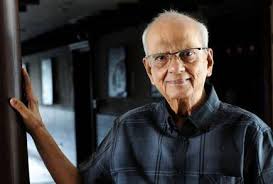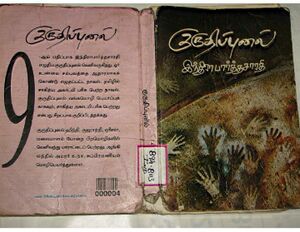Indira Parthasarathy
இந்தப் பக்கத்தை தமிழில் வாசிக்க: இந்திரா பார்த்தசாரதி
Indira Parthasarathy ('Ee. Paa') (July 10, 1930) is one of the forerunners in modern Tamil literature. His literary achievement includes numerous novels, short stories and plays. He is a recipient of the PadmaShri Award. He received Sahitya Akademi Award for his novel 'Kuruthippunal' and is currently a 'Fellow' of the Sahitya Academy. He was a professor of Tamil literature with a high proficiency in English language, a Marxist with a deep knowledge of Vaishnavite Bhakti literature.
Most of his novels deal with the life and psyche of the upper middle-class. They are satirical in nature and depict metropolitan life using mostly fictional characters in government service.
Birth, Early life, Education
He was born as Parthasarathy. He generated his pen name by enjoining his wife's name 'Indira' to his own. Born on 10th July 1930 to a Tamil Vaishnavite family in Chennai, he grew up in Kumbakonam. Ee.paa went to school when he was 9 years old and was directly admitted to class six. He familiarised himself with Tamil literary personalities such as Thi.Janakariman and Karichchan Kunju at a young age. Thi. Janakiraman was also his schoolteacher. Ee.Paa had his Under-graduation from Kumbakonam Arts college and Post-graduation from Chidambaram Annamalai university.
Personal life
Indira Parthasarathy started his career as a Tamil teacher at the National College in Trichy in 1952. He later worked as a Tamil lecturer in Delhi University (1962-2002) and after his retirement there, became the Professor of Drama in the department of Performing Arts in Pondicherry University. For few years (1981-1986) he was a visiting professor of Indian philosophy and culture at the University of Warsaw in Poland. He has penned those abroad reflections in a novel 'Yesuvin Thozhargal' (Yesu's friends). He currently lives in Chennai.
Family
His family backdrop familiarised him to Vaishnavite bhakti literature but piqued his interest in Marxism as well. Ee. Paa's father was an ardent Vaishnavite. On the other hand, his brother Venkatachari was involved in leftist politics. Ee.Paa inherited a passion to reading from his family. Both his grandmother and mother were voracious readers. He has used his wife’s first name for his nom de plume.
Literary Contribution
Short Stories
In an interview to Vikatan, he recalls that he wrote his first short story at the age of 15. The story was about the increased number of young widows in an Agrahaaram (Brahmin locality).
His first short story that got published was in 1964, 'Manitha Enthiram' (human machine) in the magazine Anandha Vikatan, as a signature story.
"The form of the short story is shaped by the unconscious mind of its author. It has no specific grammar. Forcing one to create a literary work in accordance with a particular theory is like saying that a woman who has studied medical science can only bear a child" says Ee.Paa. This principle of him can be applied to understand his novels as well.
Novels
His first novel 'Kaalavellam’ (deluge of Time) was published in 1968. He creates multi-dimensional characters in it and depicts interactions, synchronicity and contrasts between them to convey the vision in this and in all of his novels as well. Later, the novels he wrote satirically on Delhi's political milieu, Suthanthira bhoomi (free world), Thanthira bhoomi (tricky world) brought him fame.
His autobiographical novel, 'Verpatru’ (roothold) presents Ee.Paa inmost as a student and a literary figure to its readers.
He received Sahitya Akademi Award for his novel 'Kuruthippunal' (bloodbath) which presented the 1968 real incident: the caste-based massacre in Keezhvenmani Village, Thanjavur District, in a unique perspective. This novel saw him demonstrate that the caste/class divisions of people are not just determined by external factors such as economic conditions alone, but also internal factors such as their culture and myths.
Plays
Though Tamil literati had lost hopes on the literary form of Play, Ee. Paa was considerably attracted by it. His first play was 'Mazhai’ (rain). It was staged amidst various protests in Dakshina Bharata Nataka Sangam in Delhi by Bharathi Mani. This encouraged Ee.Paa to continue writing more plays. 'Porvai Portthiya udalgal' (corpses shrouded) is his most important work. It was a widely discussed work as its content was the existential crisis during the Emergency period imposed in India for 21 months between 1975-1977.
In Delhi, Ee.Paa was more recognised as a playwright than a novelist because the then popular magazine 'Enact’ published most of his plays in English translation. His historical plays such as 'Aurangazeb’ and 'Ramanujar’ are still very popular.
After his retirement as a professor of Tamil from Delhi University, he was offered to work at Pondicherry university. He insisted to work as a professor of drama, and later became instrumental in forming its Department of Performing arts.
He is conferred with a Doctor of Philosophy by the Delhi University for his research on Alwars (Vaishnavite saints). The play 'Ramanujar' was a result of these research and it later received 'Saraswathi Sammaan’ award.
Films
- Ee.Paa's 'Kuruthippunal' (bloodbath) novel was adapted into a 1983 Tamil film 'Kann sivanthaal mann sivakkum' (bloodshot eyes causes a gory land) directed by Sridhar Rajan.
- K.S.Sethumadhavan adapted Ee.Paa's novella 'Ucchiveyil' (highnoon) into a 1990 Tamil film 'Marupakkam' (the other side). It received the 'Swarna Kamal' award from the president of India.
Literary Significance
In Tamil Literature, Indira Parthasarathy manifested the power struggles, mind games played by the bourgeois, intellectual complexities that are typical of a metropolitan life. His works, through the subtle satire, depicts the attitudes of the bureaucrats and the politicians who holds the power directly and also that of working class who witnesses it every day being part of that power centre and at the same time enslaved to it. His early novels from Delhi, 'Thanthira Bhoomi’ and 'Suthanthira Bhoomi’ are best examples.
Human pretensions occupy more space in Ee.Paa's works. His is an intellectualised dehumanised view. Thus, his fiction emphasised Freudian psychology. His style has been to analyse the Psyche of the characters through the narrative of the story.
In the 70s, Ee.Paa transposed towards existentialist thoughts. Intellectual humour slowly became fatuous. He chose drama as the best form to express this during the transforming period. It is thus through these plays that Ee.Paa is considered one of the pioneers of modern Tamil play. In particular, his 'Porvai Portthiya udalgal' (corpses shrouded) is considered as the best Realist work then and now. His later novels have a satirical take on the decline of our values in politics. 'Mayamaan Vettai’ (hunt of the delusive doe), 'Vedapuratthu Vyapaarigal’ (traders of Vedapuram) stand testimony to this statement.
Awards
- Sahitya Akademi Award (for novel Kuruthippunal)
- Saraswathi Sammaan Award (for the Play Ramanujar)
- Sangeet Natak Akademy Award
- Bharatiya Bhasha Award
- PadmaShri (2010)
- The Hindu Lit for Life - The Lifetime achievement award.
- Sahitya Academy Fellowship
Works
Short Stories
He has written more than hundred short stories. They are published as several compilations by various publishers.
- Naasakaara gumbal (destructive mob)
- Manitha Dheivangal (divine human)
- Mutthukkal patthu (ten pearls)
- Indira Parthasarathy Siru Kathaigal - 2 Volumes. (Short stories)
Novels
- Kaalavellam (1968) (the deluge of Time)
- Aagasath Thamarai (celestial lotus)
- Maayamaan Vettai (hunt of the delusive doe)
- Thanthira Bhoomi (tricky world)
- Thiraigalukku Appaal (beyond veils)
- Saththiya Sothanai (test of truth)
- Kuruthippunal (Bloodbath) (Recipient of Sahitya Akademi award)
- Krishna Krishna
- Vedapuraththu Vyaaparigal (traders of Vedapuram)
- Suthanthira Bhoomi (free world)
- Helicoptergal Keezhae Irangivittana (the Helicopters have landed)
- Verpatru (roothold)
- Venthu Thanintha Kaadugal (woods burnt down)
- Agni (fire)
- Theervugal (islands)
- Yesuvin Thozhargal (Yesu's friends)
- Nilam Ennum Nallaal (Earth, the damsel) (Original story of the play 'Mazhai')
- Uchchi Veyil (high noon) (It was later adapted as a feature film.)
Plays
- Mazhai (Adapted from the novel - Nilam Ennum Nallal)
- Porvai Portthiya Udalgal (corpses shrouded)
- Kaala Yanthirangal (time machines)
- Nandan Kathai (story of Nandan)
- Kongai Thee (burning breast)
- Aurangazeb
- Ramanujar
- Iruthi Aattam (final game) (translation of William Shakespeare's King Lear)
- Sooraavali (tempest) (translation of William Shakespeare's The tempest)
- Pasi (hunger)
- Kovil (shrine)
- Dharmam
- Nattakkal (installation)
- Punarapi Jananam, Punarapi Maranam (birth again death again)
- Veedu (abode)
Translations
The Plays Iruthi Aattam and Sooraavali are inspired from Shakespeare's The King Lear and The Tempest, respectively.
Translated Works
Most of his plays were translated into English by the Delhi-based magazine 'Enact'. This magazine dedicated to Theatre was run by Rajendra pal.
Ee.paa's novels were translated into English.
- Krishna Krishna - Translated by Ee. Pa.
- Kuruthipunal - 'River of Blood' translated by Ka. Na. Su.
- Thiraigalukku Appal - 'Through the Veils' by Lakshmi Kannan.
References
✅Finalised Page
First published on:
17-Aug-2023, 20:14:44 IST


